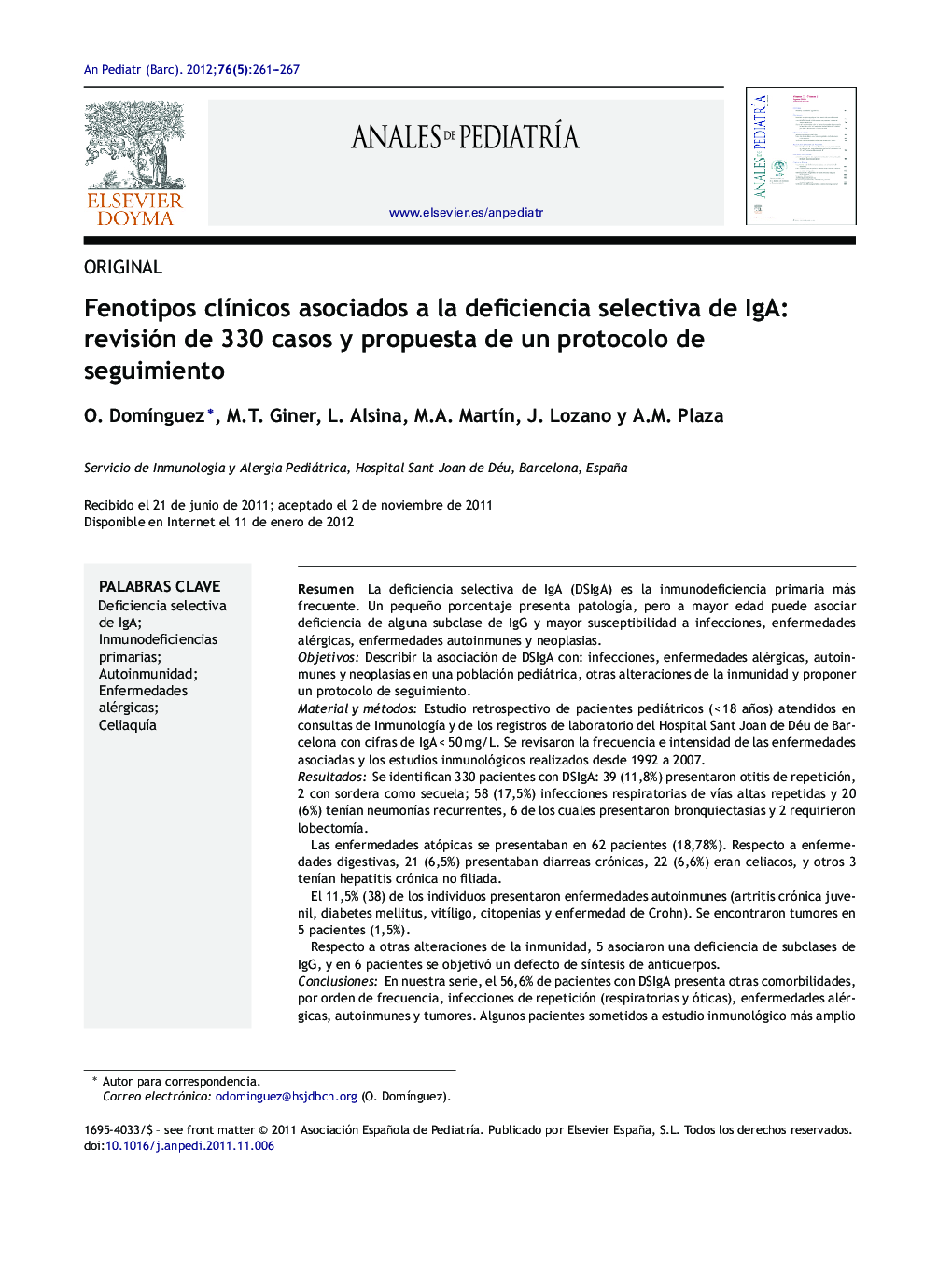| Article ID | Journal | Published Year | Pages | File Type |
|---|---|---|---|---|
| 4142328 | Anales de Pediatría | 2012 | 7 Pages |
ResumenLa deficiencia selectiva de IgA (DSIgA) es la inmunodeficiencia primaria más frecuente. Un pequeño porcentaje presenta patología, pero a mayor edad puede asociar deficiencia de alguna subclase de IgG y mayor susceptibilidad a infecciones, enfermedades alérgicas, enfermedades autoinmunes y neoplasias.ObjetivosDescribir la asociación de DSIgA con: infecciones, enfermedades alérgicas, autoinmunes y neoplasias en una población pediátrica, otras alteraciones de la inmunidad y proponer un protocolo de seguimiento.Material y métodosEstudio retrospectivo de pacientes pediátricos (< 18 años) atendidos en consultas de Inmunología y de los registros de laboratorio del Hospital Sant Joan de Déu de Barcelona con cifras de IgA < 50 mg/L. Se revisaron la frecuencia e intensidad de las enfermedades asociadas y los estudios inmunológicos realizados desde 1992 a 2007.ResultadosSe identifican 330 pacientes con DSIgA: 39 (11,8%) presentaron otitis de repetición, 2 con sordera como secuela; 58 (17,5%) infecciones respiratorias de vías altas repetidas y 20 (6%) tenían neumonías recurrentes, 6 de los cuales presentaron bronquiectasias y 2 requirieron lobectomía.Las enfermedades atópicas se presentaban en 62 pacientes (18,78%). Respecto a enfermedades digestivas, 21 (6,5%) presentaban diarreas crónicas, 22 (6,6%) eran celiacos, y otros 3 tenían hepatitis crónica no filiada.El 11,5% (38) de los individuos presentaron enfermedades autoinmunes (artritis crónica juvenil, diabetes mellitus, vitíligo, citopenias y enfermedad de Crohn). Se encontraron tumores en 5 pacientes (1,5%).Respecto a otras alteraciones de la inmunidad, 5 asociaron una deficiencia de subclases de IgG, y en 6 pacientes se objetivó un defecto de síntesis de anticuerpos.ConclusionesEn nuestra serie, el 56,6% de pacientes con DSIgA presenta otras comorbilidades, por orden de frecuencia, infecciones de repetición (respiratorias y óticas), enfermedades alérgicas, autoinmunes y tumores. Algunos pacientes sometidos a estudio inmunológico más amplio podrían desarrollar una forma de defecto humoral más grave como una deficiencia de subclases de IgG.
Selective IgA deficiency is the most common Primary Immune Deficiency. Only a small proportion of these patients present during childhood, but this proportion increases over the years, and may be associated with an IgG subclass deficiency with increased susceptibility to respiratory and digestive tract infections. During childhood, IgA deficient patients may also refer to symptoms related to allergic and autoimmune diseases or tumours.AimsTo describe the relationship of selective IgA deficiency with infections, allergic diseases, autoimmune disorders and tumours. To investigate the presence of other immune disorders associated with selective IgA deficiency. To suggest a follow-up protocol for these patients.MethodsRetrospective study of paediatric patients (<18 years) being followed-up in the Clinical Immunology Department between 1992 and 2007, as well as laboratory records with IgA values below 50 mg/L. Clinical records were reviewed (frequency and intensity of diseases associated with selective IgA deficiency) along with immunology tests performed.ResultsA total of 330 paediatric patients were identified with a selective IgA deficiency: 39 (11.8%) suffered from recurrent ear infections (2 developed secondary deafness), 58 (17.5%) from recurrent upper respiratory tract infections, and 20 patients (6%) from recurrent pneumonia, 6 of whom developed secondary bronchiectasis and 2 underwent a lobectomy.A relationship with atopic disease was found in 62 (18.78%) of patients. Regarding digestive disorders, chronic diarrhoea was found in 21 (6.5%), coeliac disease in 22 (6.6%), and persistently high plasma transaminases in 3.Autoimmune manifestations were found in 38 (11.5%), juvenile chronic arthritis, type 1 diabetes, vitiligo, cytopenia, and Crohn's disease, amongst others). Tumours were identified in 5 (1.5%).An IgG sub-class deficiency was found in 5 patients (4%), and 6 patients had a confirmed deficiency in antibody production.ConclusionsIn our cohort, 56.6% of patients with IgA deficiency showed other comorbidities which were, in decreasing frequency: recurrent infections (respiratory and ear infections), allergic diseases, autoimmunity and tumours. Some patients will develop a more severe humoral defect (IgG subclass deficiency with or without antibody deficiency).
